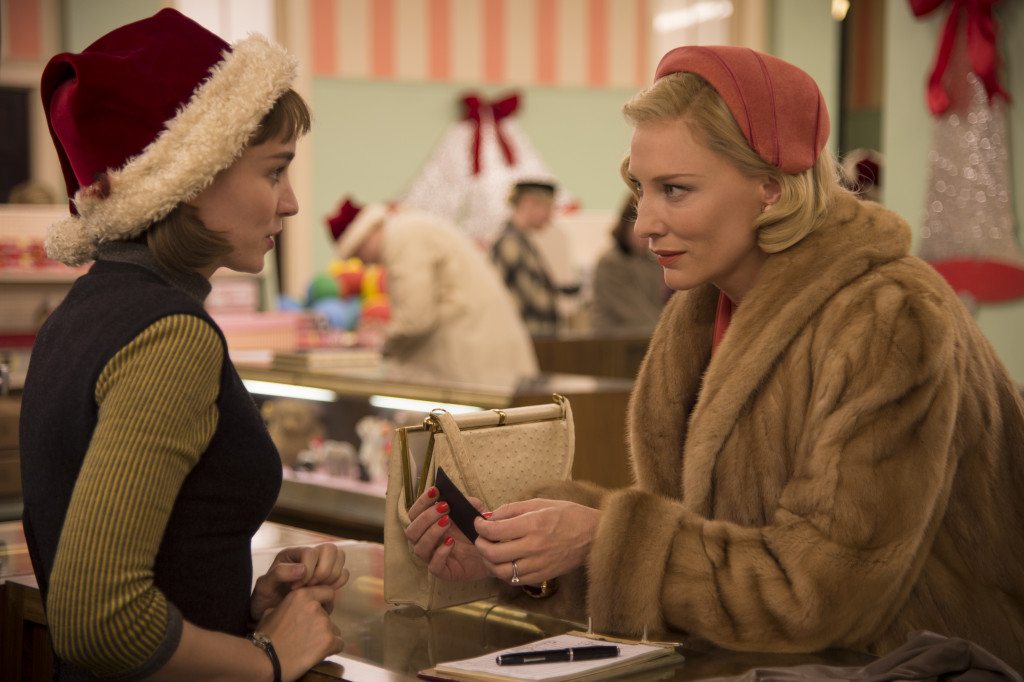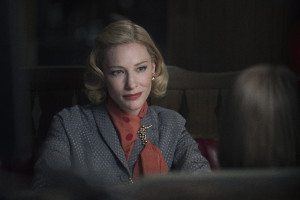Carol
[dropcap]A[/dropcap] furtive glance. A distinctive perfume. The touch of a hand upon gloved fabric. A song playing on a car’s radio that fades away the more you focus on the other person sitting in the driver’s seat, the colour of their lips, the curve of their neck… These are the details that Todd Haynes focuses on in Carol, an utterly spellbinding adaptation of Patricia Highsmith’s groundbreaking novel that actually manages to evoke the experience of falling in love, with intoxicating, disorientating precision.
We begin by rising out of the gutter into 1950s Manhattan, a world of smoky streets, smart suits and muted green colour. It feels weird to begin a review by praising costumes and set design, but good grief, this has to be one of the most perfect evocations of the period ever committed to celluloid. Carol initially weaves its spell with detail, by giving us people that could have stumbled straight out of an Edward Hopper painting, and who talk and act like you’d imagine people in the 50s actually would. It’s all the more effective when we meet our protagonists: we follow a man who goes over to a table in a restaurant, where two women, Therese (Rooney Mara) and Carol (Cate Blanchett), are having tea. He clearly interrupts something important: Carol rises to leave, but not before delicately placing her hand on Therese’s shoulder.
The rest of the film then travels back in time to explore the enormous significance of that gesture. We see Therese, working at a toy department, spot Carol from across the room. She speaks with a masculine authority that shocks (and excites) the timid Therese, so when she leaves her glove behind and insists on them having lunch, it’s hard to see it as anything else but the initiation of a relationship. Therese wastes no time in falling directly into a heady affair – visiting her house at Christmas, then embarking on a lengthy road trip across the country – but around the edges are constant threats to their happiness, namely Carol’s jealous husband Harge (Kyle Chandler), who is trying to acquire sole custody of their daughter.
What’s so remarkable about Therese and Carol’s journey is that it quietly defies expectation at every turn. The two women don’t kiss or have sex until (spoilers) at least an hour into the film, but we see their relationship change and adapt, intensify, through little more than subtle body language. This is largely thanks to the inarguably superb central performances that requires little explanation: Blanchett and Mara match each other perfectly, using elements of their star image – Blanchett’s regality, Mara’s doe-eyed innocence – and building on it, subverting it, realising the heart-wrenching vulnerabilities of their characters with godlike grace all the way to their natural, mutually-respectful conclusion. But there’s also a great script here: Phyllis Nagy (who was, coincidentally, a friend of Highsmith) paces out the story with great stretches of silence, where nothing – but, of course, everything – happens.
It shouldn’t come as a surprise how much I love this film. Thus far, Todd Haynes has realised two masterpieces: 1995’s Safe and 2002’s exquisite Far From Heaven, both of which feature Julianne Moore doing career-best work. Of the two, I think it’s Far From Heaven that can be seen as Carol’s companion piece – they’re both about the incredible bravery of their central, feminist characters, as well as the appalling hypocrisy of the period, lambasting those who find themselves perturbed by what they consider “different”.
But the key difference in Carol is that there’s more hope, not just for its characters but for its audience. Almost every frame of the film features at least one female character who happens to be a lesbian, but it never feels compelled to patronize
But the key difference in Carol is that there’s more hope, not just for its characters but for its audience. Almost every frame of the film features at least one female character who happens to be a lesbian, but it never feels compelled to patronize, to explain their relationship through the norms of heterosexual film language. Their relationship just…is. Haynes and Nagy lay the foundations for a state of new normal, and if it takes (i.e. makes money) then, well, it should spell out great things for the future of film romance.
I suspect that, when it comes to investigating what makes Carol so special, you could quite easily break it down into its base elements: particularly the sad melodramatic touches of Ozu and Kazan, and the fragile score by Carter Burwell. But, at the end of the day, I think my love for it is more irrational, as untidy and stomach-churning as the affair itself. Really, I can only say: what a film.
Director: Todd Haynes
Cast: Cate Blanchett, Rooney Mara, Kyle Chandler, Sarah Paulson
Length: 118 minutes
Country: UK/USA



Comments